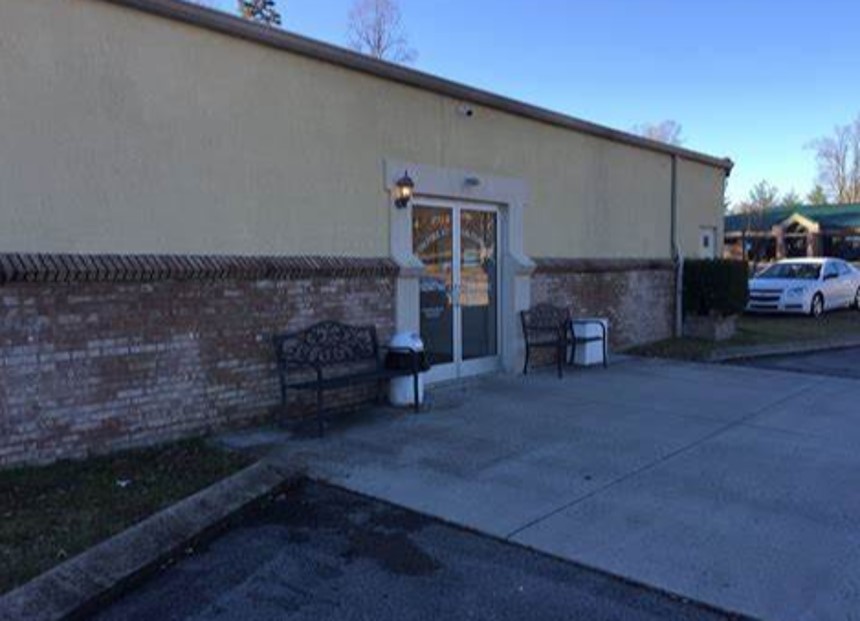
Investigation Reports. Officials identify, disrupt, and dismantle pain relief centers and pain management clinics involved in over-prescribing opioid painkiller pills and controlled substances, and operating as pill mills.
According to the National Drug Intelligence Center, an estimated 7,500 pill mills operate in the United States. A pill mill is a type of business that prescribes narcotic medications in more significant numbers than would be prescribed in regular physician offices. State and local investigators came up with the name “pill mills.”
IMPORTANT NOTE: Not all pain management clinics are engaged in criminal activity. Many clinics across the state operate legally and employ trained personnel and doctors who treat patients who legitimately suffer from pain.
SAN JOSE, CALIFORNIA. Dr. Donald Siao, Family Medicine Physician was convicted of 12 counts of distributing the controlled substances oxycodone and hydrocodone outside the scope of his usual professional practice.
At trial, the evidence demonstrated that after identifying Dr. Siao in a separate prescription fraud investigation, investigators reviewed a California state database and discovered that Dr. Siao had written 8,201 prescriptions for controlled substance medications in one year. An investigation ensued and found Dr. Siao prescribing oxycodone and hydrocodone in increasing quantities in over 17 visits with four separate undercover law enforcement agents posing as patients. The undercover agents received prescriptions from Dr. Siao despite complaining of only vague pain or discomfort, requesting specific opioids by name, and admitting to sharing the pills with friends and coworkers.
Evidence at trial further established that Dr. Siao prescribed dangerous opioids to his patients E.J. and A.J., a mother and son, notwithstanding obvious red flags. Dr. Siao continued to prescribe opioids to the mother after she repeatedly claimed that her pills had been lost or stolen, despite Dr. Siao receiving an alert from her insurer regarding her opioid prescriptions and despite Dr. Siao being advised that she was jailed for selling pills, all documented in Dr. Siao’s medical file.
Similarly, Dr. Siao prescribed opioids to the son A.J. even after two overdoses. Dr. Siao continued to prescribe opioids to A.J. after he repeatedly claimed the opioids were lost or stolen and even after he had been flagged by his prior medical provider for drug-seeking behavior, after his mother reported he had stolen her medications, and after A.J.’s mother had fatally overdosed on opioids. These facts were all documented in Dr. Siao’s medical file for A.J.
Trial evidence also demonstrated that Dr. Siao refused to heed warnings that his prescriptions were dangerous. Evidence showed Dr. Siao was aware that DEA highly scrutinized opioid prescriptions, even pointing out to one of the undercover officers posing as a patient that a nationwide epidemic was underway in which large numbers of people were addicted to and dying from opioids. Dr. Siao nevertheless continued to prescribe opioids to the agents upon their request and with little to no physical examination, and sometimes during visits lasting only a few minutes.
Law enforcement agents interviewed Dr. Siao in November 2018 about his prescribing practices, and Dr. Siao admitted he was aware of the California Medical Board’s Guidelines for Prescribing Controlled Substances for Pain, had learned the dangers of addiction, and had been taught how to identify drug-seeking patients.
What is Oxycodone and How Is It Used (United States Drug Enforcement Administration)
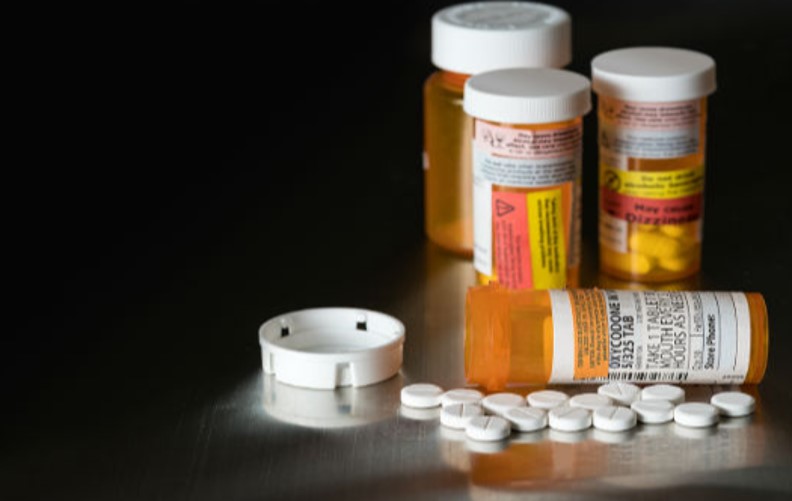
Pharmacist/Owner Lawrence Howen, Nor-Cal Pharmacies Inc., doing business as Lockeford Drug, reportedly knew or deliberately ignored that they were dispensing controlled substances pursuant to prescriptions that were not for a legitimate medical purpose.
Specifically, the injunction states that the defendants dispensed 116,330 pills, including more than 100,000 oxycodone and hydrocodone pills, based on invalid prescriptions presented by Joe Anthony Bernal, a defendant charged in the Northern District of California in a separate criminal case. They did so despite circumstances that were highly suggestive that Bernal was not presenting them with legitimate prescriptions. As also stated in the injunction, the defendants took no steps to determine the validity of Bernal’s purported prescriptions and were not concerned if those medications caused patient harm. Bernal is charged with conspiring with several others to illegally acquire and distribute oxycodone and hydrocodone.
“As a pharmacy that fills prescriptions for opioids and other dangerous drugs, the defendants had an obligation to fill only legitimate prescriptions,” U.S. Attorney Talbert said. “The defendants failed to comply with that obligation, and thereby failed in their responsibility to prevent the opioids from being diverted into illicit channels. This case demonstrates our firm commitment to enforcing federal laws involving prescription drugs.”
“The defendants went from pharmaceutical provider to drug dealer when they knowingly provided controlled substances without a legitimate medical purpose,” said DEA Special Agent in Charge Brian M. Clark. “This egregious behavior by a trusted individual and entity not only fuels the fire of the opioid epidemic, but also wreaks havoc on the community they serve. DEA is committed to keeping our communities safe and healthy and will hold registrants accountable by ensuring they are in compliance with the law.”

HANFORD—Dr. Francis Lagattuta’s specialty is physical medicine and rehabilitation, a common pain management field. LAGS Medical Centers had multiple pain management clinics across the state including in Tulare, Kings, Fresno, Madera, Monterey, Santa Cruz, and Merced counties. The California portion of the chain was organized as more than two dozen corporations and limited liability corporations owned by Dr. Lagattuta. His son, Francis P. Lagattuta II, was a manager for the company.
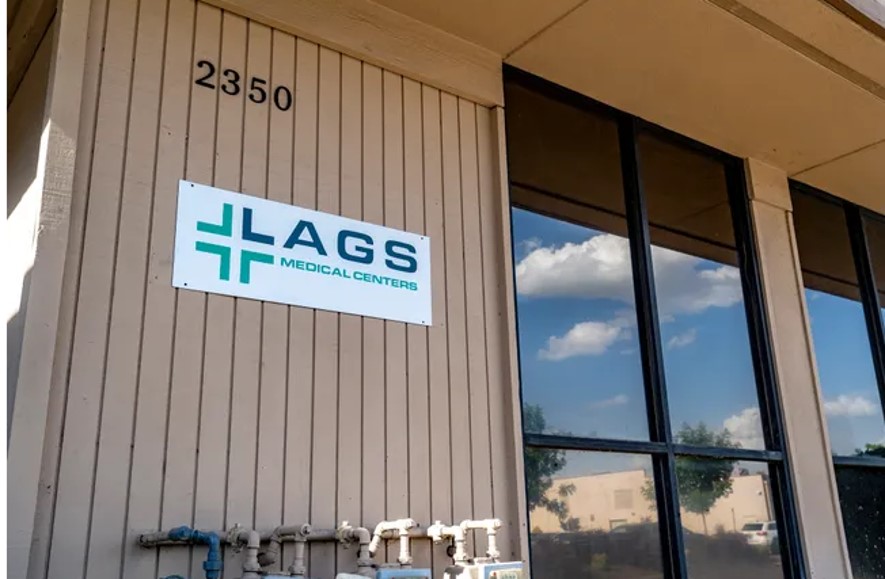
Before moving to California in 1998, Dr. Francis Lagattuta lived in Illinois and worked as a team doctor for the Chicago Bulls during its 1995-96 championship season.
Out West, he opened a clinic in Santa Maria, a Latino-majority city along California’s Central Coast known for its strawberry fields, vineyards and barbecue. From 2015 to 2020, the chain grew from a couple of clinics in Santa Barbara County to dozens throughout California, largely in rural areas, as well as far-flung locations in Washington state, Delaware and Florida.
Much of the work at Lags Medical was performed by a relatively small number of nurse practitioners and physician assistants, each juggling dozens of patients a day with sporadic, often remote supervision by the medical doctors affiliated with the clinics, according to interviews with former employees.
Lagattuta himself lived in Florida for more than a year while serving as Medical Director, according to testimony he provided as part of an ongoing malpractice lawsuit that named Lagattuta, Lags Medical and a former employee as defendants.
Former employees said they were given bonuses if they treated more than 32 patients in a day, a strategy Lagattuta confirmed in his deposition in the malpractice lawsuit. “If they saw over, like, 32 patients, they would get, like, $10 a patient,” Lagattuta testified.
Interviews with 17 former patients revealed common observations at Lags Medical Clinics, such as crowded waiting rooms and an assembly-line environment. Many reported feeling pressure to consent to injections and other procedures or risk having their opioid supplies cut off.
Audrey Ramirez said she had worried for years that the care she was receiving at a Lags Medical Clinic in Fresno was subpar. In the past couple of years, she said, there were sometimes so many patients waiting that the line wrapped around the building. Ramirez, 52, suffers from trigeminal neuralgia, a rare nerve disease that sends shocks of pain across the face so severe it’s known as the “suicide disease.” Over the years, Lags Medical had taken over prescribing almost all her medications. This included not only the opioids and gabapentin she relies on to endure excruciating pain, but also drugs to treat depression, anxiety and sleep issues. She was among numerous patients who said they felt they needed to undergo the recommended procedures if they wanted continued prescriptions for their pain medications. “If you refuse any treatment they say they’re going to give you, you’re considered noncompliant and they stop your medication,” Ramirez said. Audrey said she picked up her final refill from Lags Medical on June 4 and by July 4 had no meds left to treat her pain. Ramirez said she called every pain management clinic in Fresno, but none were taking new patients.
Pain management experts described the use of extensive screening as unnecessary in routine pain treatment; the overuse of such tests has been the subject of numerous Medicare investigations in recent years.
Private pain clinics like Lags Medical were loosely regulated and generally were not required to hold a special license from the state. But the physicians who work there are regulated by the Medical Board of California.
On May 13, the cellphones of thousands of California residents undergoing treatment for chronic pain lit up with a terse text message: “Due to unforeseen circumstances, Lags Medical Centers will be closing effective May 19, 2021.”
In a matter of days, Lags Medical, a sprawling network of privately owned pain clinics serving more than 20,000 patients throughout the state’s Central Valley and Central Coast, would shut its doors.
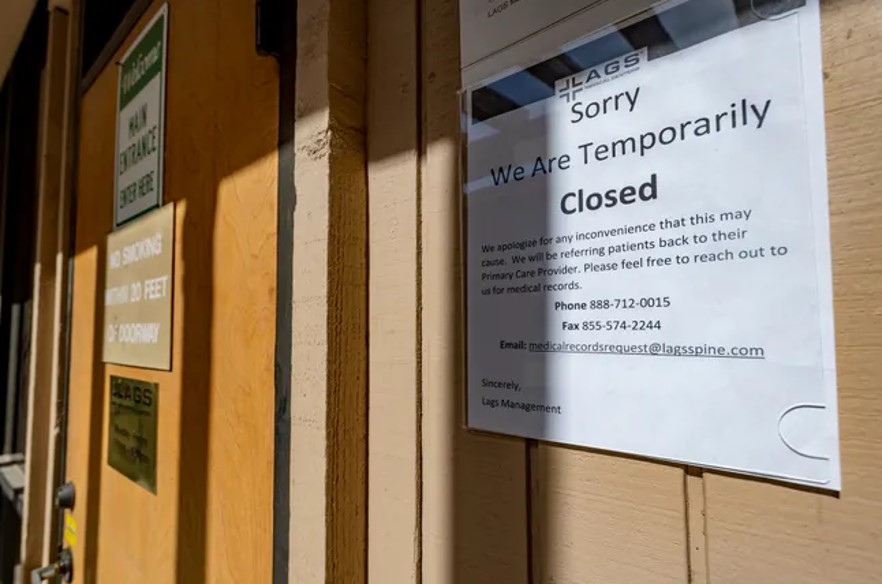
Its patients, most of them working-class people reliant on government-funded insurance, were left without ready access to their medical records or handoffs to other physicians. Many patients were dependent on opioids to manage the pain caused by a debilitating disease or injury, according to alerts about the closures that state health officials emailed to area physicians. They were sent off with one final 30-day prescription, and no clear path for how to handle the agony—whether from their underlying conditions or the physical dependency that accompanies long-term use of painkillers—once that prescription ran out.
The closures came on the same day that the California Department of Health Care Services suspended state Medi-Cal reimbursements to 17 of Lags Medical’s 28 locations, citing without detail “potential harm to patients” and an ongoing investigation by the state Department of Justice into “credible allegations of fraud.”
In the weeks that followed the closures, county officials throughout the Central Valley saw a flood of patients on high doses of opioids in search of new providers, they said. Patients couldn’t access their medical records, so other providers had no idea what their treatments had been.
“We had to create a crisis response to it because there was no organized response at that time,” said Dr. Rais Vohra, the interim health officer for Fresno County.
“We know that when you stop prescribing opioids, some people end up with death from suicide, overdose, increased illicit opioid use, pain exacerbations. It’s really important to have a continuity, and that is not really possible in the current opioid-prescribing culture,” Coffin said. The threat to patients was so severe that the FDA issued a warning in 2019 against cutting patients off from prescription opioids.
Interviews with former Lags Medical patients and employees, as well as KHN analyses of reams of Medicare and Medi-Cal billing data and other court and government documents, suggest the clinics operated based on a markedly high-volume and unorthodox approach to pain management. This includes regularly performing skin biopsies that industry experts describe as out of the norm for pain specialists, as well as notably high rates of other sometimes painful procedures, including nerve ablations and high-end urine tests that screen for an extensive list of drugs.
Those procedures generated millions of dollars in insurer payments for Lags Medical Centers, an affiliated network of clinics under the ownership of Dr. Francis P. Lagattuta. The clinics’ patients primarily were insured by Medicare, the federally funded program for seniors and people with disabilities, or Medi-Cal, California’s Medicaid program for low-income residents.
After Lags Medical closed, another patient, Munoz said her primary care doctor initially refused to refill her opioid prescriptions. She said she called the Lags Medical offices to try to get a copy of her medical records to prove her need, and even showed up in person. But she said she was unable to get them. As the pills dwindled and the pain surged, Munoz said, it became hard to leave her home. “I missed a lot of bingo, a lot of grocery shopping, a lot of going to my grandkids’ birthday parties. You miss out on life,” she said. Ultimately, she said, her primary care doctor referred her to another pain clinic, and she was able to resume her prescription.
Even with pain medications, Munoz said, she never received true relief during her time as a patient at Lags Medical. She said she felt coerced to get several injections, none of which seemed to help. “If I didn’t get the procedures, I didn’t get the pain medication,” she said. Her husband, Ramon, a landscaper who was also a patient, received an injection there that he said left him with permanent stiffness in his neck.
Gina, a retired nurse, had been a Lags Medical patient for six years. She said she called every practice she could find in her Central Coast town, and was put on a waiting list at one. Suffering from a severe case of scoliosis, she started rationing the pain pills she had come to rely on. When she finally secured an appointment, she said, she was told by the doctor she was on “some very strong meds” and he would fill only one of her two prescriptions. She started experiencing withdrawal symptoms — sweating, lost appetite, sleeplessness, anxiety. Worst of all, her pain “came back with a vengeance,” she said. “I think about this, what I’d have been like if I’d never gone through pain management. I sometimes wonder if I’d be better off.”
As for Ramirez, her primary care doctor finally secured an appointment for her at another pain clinic, she said. It was in the same space as the old Lags Medical Clinic, and she said she recognized many of the staff members. But now there was a new name: Central California Pain Management. From her perspective, it was as if nothing had changed. And she still doesn’t know whether she needs to worry about the care she received during more than four years at Lags Medical.
The new clinic’s owner, Dr. Ashok Parmar, said that he was leasing the space and that Lagattuta was his landlord.
Lags Spine & Sportscare Medical Centers (LAGS Medical) and Francis P. Lagattuta, M.D., the Owner and Medical Director of LAGS Medical, agreed to pay $11,388,887 to resolve allegations that they violated the False Claims Act by submitting millions of dollars of false claims.
“Dr. Lagattuta and Lags Medical engaged in a brazen scheme to defraud Medicare and Medicaid of millions of dollars by inflicting unnecessary and painful procedures on patients whom they were supposed to be relieving of pain,” said U.S. Attorney Talbert.
Francis Lagattuta, Former Medical Director of LAGS Medical Centers Agreed to be Excluded for 5 Years for Allegedly Submitting Claims for Medically Unnecessary skin biopsies, spine surgeries, and urine drug testing (HHS-OIG, July 2023)
Dr. Francis Lagattuta returned to Private Practice on June 1, 2023. According to his website, in the last 20 years, he concentrated on providing relief for the underserved and developed a comprehensive pain program for these patients.
If you recognize any of these signs, you can submit your anonymous tip through the DEA online Tip Line and report the doctors or facility.
In the 1990s and early 2000s, problematic pain clinics hooked patients on opioids, then demanded cash to continue prescriptions, said Dr. Theodore Parran, Professor of Medicine at Case Western Reserve University and has served as an expert witness in federal investigations into pain clinics.
“What has replaced them are troubled pain clinics that hook patients with the meds and accept insurance, but overuse procedures which really pay well,” he said. For patients, he added, the consequences are not benign.
Senior editor at Reason, Elizabeth Nolan Brown, details a new ruling finding Walgreens liable for worsening the opioid crisis in San Francisco.
SACRAMENTO, CALIFORNIA—Dr. Edmund Kemprud, 78, of Dublin was convicted of 14 counts of illegally issuing hundreds of opioids and other drug prescriptions at several locations in the Valley and Bay Area and Central Valley, including in the back room of a Nail Salon and Medical Spa, where patients received non-surgical cosmetic procedures, in the city of Tracy, federal prosecutors said.
Dr. Kemprud charged $79 per visit and churned out prescriptions so quickly he would see at least 30 patients in a day. Dr. Edmund Kemprud prescribed hydrocodone, alprazolam and oxycodone—all highly addictive—to patients who did not medically require them, Acting U.S. Attorney Phillip A. Talbert for the Eastern District of California reported.
Undercover officers testified that between September 2018 and March 2019, Dr. Kemprud prescribed opioids on 14 occasions without determining the patients’ medical and prescription histories, without conducting a proper medical examination, without confirming the legitimacy of the patients’ complaints, and without assessing the risk of aberrant drug behavior.
Several pharmacies were so troubled by Dr. Kemprud’s prescriptions that they instituted policies to not fill them, prosecutors said.
Several state and federal government agencies investigated the case, including the California Department of Justice, the Bureau of Medi-Cal Fraud and Elder Abuse Drug Diversion Team and the Drug Enforcement Administration.
Evidence introduced at trial showed that Dr. Kemprud ignored indications that his patients were addicts or that they were diverting the drugs.
“This defendant displayed a blatant disregard for patient safety and the law,” Acting U.S. Attorney Talbert said. “Although he knew his treatment of patients was unlawful, he continued to pump dangerous drugs into the community. It took the effort of agents, investigators, undercover officers, medical professionals who practiced with the defendant and pharmacists to bring an end to Kemprud’s illicit prescription writing. The U.S. Attorney’s Office will continue our vigorous pursuit of those who fuel the opioid epidemic for their own personal benefit.”
“For nearly two years, we have all faced the impacts of the global pandemic, but before the pandemic began, we were already fighting a deadly opioid epidemic,” said California Attorney General Rob Bonta. “We trust our doctors by putting our health in their hands. When doctors violate their oath to do no harm, we must take action —especially when it comes to illegally prescribing opioids. I’m grateful for our investigative partners at the federal level, and to the U.S. Attorney for successfully putting a stop to this doctor’s harmful practices.”
“Fueled by greed, Edmund Kemprud went from doctor to drug dealer when he began running a prescription pill mill for powerful opioids. Dr. Kemprud’s actions not only preyed upon those battling addiction, but also contributed to the ongoing opioid crisis. This verdict underscores our commitment to hold unscrupulous doctors accountable for their actions,” stated DEA Special Agent in Charge Wade R. Shannon.
SAN DIEGO, CALIFORNIA. Dr. Egisto Salerno’s medical practice was located on El Cajon Boulevard. He pleaded guilty, admitting that he signed prescriptions for 78,544 pills that lacked a legitimate medical purpose and were outside the usual course of professional medical practice.
Through his plea agreement, Dr. Salerno also admitted that an undercover federal agent who visited his office on six occasions received six hydrocodone prescriptions. In a separate instance, on a date when the undercover agent did not visit Salerno’s office and the doctor did not see him, Dr. Salerno acknowleged that a prescription was improperly issued by him in the name used by the undercover agent. After the prescription was issued, Dr. Salerno ginned up and signed a progress note in the “patient” chart for the purported visit that did not occur.
The prescription was then picked up by another as part of a larger scheme to divert these pills. That scheme involved two medical assistants in Salerno’s practice who falsified medical records and sold prescriptions that Dr. Salerno had pre-signed to a co-defendant though the “patients” identified on those prescriptions who did not even see him. As Dr. Salerno acknowledged, many of those in whose names these prescriptions were written were deceased or jailed at the time the prescriptions were written. Other defendants were convicted in this case including Salerno’s two medical assistants.
The pills were, in turn, diverted to the “capper” or patient recruiter, who also arranged to bring homeless and other individuals to Dr. Salerno’s office and paid them to secure these prescriptions from Salerno. Others assisted the patient recruiter by transporting the purported patients to Dr. Salerno’s office and then to pharmacies to pick up the pills. In turn, pills were sold in San Diego and delivered to a pharmacy in Mexico for cash.
“While the vast majority of doctors prescribe medications in compliance with federal laws, there will always be doctors like Egisto Salerno who seek profit over their patients’ best interests,” said DEA Special Agent in Charge John W. Callery. “DEA has a team dedicated to investigating those doctors who choose to violate their medical oath and illegally distribute opioids. DEA will bring these doctors to justice for their contribution to the growing opioid problem in our country.”
If you recognize any of these signs, you can submit your anonymous tip through the DEA online Tip Line and report the doctors or facility.
Those charged in the indictments include Dr. John Michael Korzelius, 68, a.k.a. “Dr. K,” of Camarillo, who worked at a Santa Ana Pain Management Clinic where he allegedly wrote medically unnecessary prescriptions to “patients” who paid cash. Over the course of two years, Dr. Korzelius and other medical professionals working under his guidance, prescribed approximately 439,090 pills of 30mg oxycodone – the highest dose of short-acting oxycodone available, and the dose most popular for the drug-abusing population, according to court documents.
Law enforcement authorities arrested four defendants charged in two federal grand jury indictments alleging a narcotics trafficking ring that sold illegal opioid prescriptions for cash through a series of sham medical clinics.
The charges in this matter stemmed from an investigation by agents with the DEA and IRS Criminal Investigation into ChiroMed, which operated a group of chiropractic, medical and wellness clinics in Los Angeles, Orange and San Bernardino counties. Dr. Korzelius, along with other medical professionals, including physician’s assistants, allegedly met with fraudulent patients and provided them with unnecessary prescriptions for drugs, including oxycodone.
The two grand jury indictments charged 10 defendants with a variety of narcotics-related offenses, including conspiracy to distribute controlled substances, possession with intent to distribute oxycodone, distribution of fentanyl, and money laundering. Along with Dr. Korzelius, the indictments charged:
- Justin Douglas Cozart, 42, of Woodland Hills, who operated and supervised the ChiroMed medical clinics;
- Damoon Joe Navarchi, 33, of Woodland Hills, who assisted Cozart in operating the clinics;
- Xavier Muduki Mabale, 42, of Anaheim, who is accused of recruiting sham patients to obtain fraudulent oxycodone prescriptions from the medical clinics;
- Mayra Barrios, 37, of Yorba Linda, who allegedly oversaw the day-to-day management of the medical clinics, including the issuance of fraudulent oxycodone prescriptions to sham patients;
- Harrison Maruje Mureithi, 42, of Norco, who allegedly coordinated the purchase, collection, packaging, and shipment of oxycodone to buyers on the East Coast;
- Duncan Wanjohi, 30, of Anaheim, who allegedly assisted Mureithi in the buying and shipping of narcotics;
- Pierre Delva, Jr., 33, of Medford, Massachusetts, who allegedly provided financing to Mureithi to purchase bulk quantities of oxycodone;
- Louise W. Mureithi, 69, of Anaheim, Harrison Mureithi’s mother, who allegedly received packages of cash sent to her son for oxycodone;
- Majid Nojavan, 42, of Laguna Niguel, charged in a spinoff case from the primary investigation, who allegedly advertised oxycodone for sale on Craigslist, sold fentanyl to an undercover police officer, and escorted the undercover police office to an Inglewood medical clinic to obtain a fraudulent oxycodone prescription.
As a result of a two-year investigation into the fraudulent medical clinics, DEA agents seized 20,737 oxycodone pills, and $177,610 in cash. Law enforcement intercepted a mailed parcel contained a teddy bear stuffed with two bags of oxycodone pills.
The investigation into the sham medical clinics was handled by the Drug Enforcement Administration and IRS Criminal Investigation. The Department of Health and Human Services, Office of Inspector General and the Torrance Police Department provided substantial assistance. The investigation of Majid Nojavan was handled by Homeland Security Investigations and the Costa Mesa Police Department.
LOS ANGELES, CALIFORNIA. Dr. Hsiu-Ying Tseng, 46, was sentenced to 30 years to life in prison. Prosecutors charged Dr. Tseng with second-degree murder for the deaths of Joey Rovero, 21, Steven Ogle, 25, and Vu Nguyen, 28.
Matthew Stavron, Ryan Latham, and Naythan Kenney fatally overdosed in 2007 and 2008 after Dr. Tseng prescribed them drugs. The young men each drove long distances to come to Tseng’s strip mall clinic for prescriptions. Stavron made a two-hour round trip from his parents’ home in San Clemente.
Dr. Tseng received a phone call from the coroner’s office alerting her to each of the deaths, according to court papers. Dr. Tseng regarded such calls as “just FYI” notices and did not perceive them as a problem, her husband, also a doctor, testified in her defense at trial.
Medical experts and law enforcement officials agree that it’s a tiny fraction of doctors who willfully prescribe drugs to patients who don’t need them.
Dr. Tseng catered to young patients who traveled long distances and paid cash for their prescriptions. She wrote prescriptions without performing meaningful medical exams and despite there being no medical necessity for the drugs.
Dr. Tseng ignored pleas from parents and loved ones concerned about the worsening addiction of sons and daughters, husbands and wives, brothers and sisters.
Medical experts and law enforcement officials blame reckless and criminal prescribing of opiate-based painkillers and other potent narcotics by doctors like Dr. Tseng for contributing to the problem.
Dr. Tseng’s lawyer, Tracy Green, defended the doctor as a well-meaning physician who had gotten in over her head in dealing with manipulative, drug-seeking patients.
Dr. Tseng wrote that she lacked sufficient training in prescribing addictive narcotics and was in denial about what was going on in her practice.
“I told myself that my patients’ conduct was beyond my control,” she wrote.
Before sentencing, Defense Attorney Green said that Dr. Tseng bore some–but not all – responsibility for the misery that flowed from her prescription pad. She pointed to the patients themselves, the pharmacies that had filled her prescriptions and other doctors who had also prescribed her patients drugs.
Moments before imposing sentence, Judge Lomeli said Tseng ran a reckless “assembly line” style practice that raked in millions of dollars while patients and their families suffered. He said that while she’d accepted some blame, she was still attempting to deflect some on others.

LOS ANGELES, CALIFORNIA. Dr. Madhu Garg, Southfork Medical Clinic.
The doctor employed by Southfork during the charged conspiracy, Madhu Garg, issued more than 10,000 prescriptions – with nearly 80% of those for hydrocodone or alprazolam, most of which were at the maximum dosage – over a 15-month period, according to records maintained by the State of California.
After a federal grand jury issued a 33-count indictment, federal authorities in Texas and Southern California arrested five defendants linked to a narcotic trafficking ring that sold illegal prescriptions for cash.
The operators of the now-closed Southfork Medical Clinic, who allegedly sold unnecessary prescriptions for drugs that included oxycodone (best known by the brand names OxyContin and Percocet), hydrocodone (commonly sold under the brand names Vicodin, Norco and Lortab), alprazolam (best known by the brand name Xanax), carisoprodol (a muscle relaxant sold under the brand name Soma) and promethazine with codeine (a cough syrup sold on the street as “purple drank” and “sizzurp”).
The doctor wrote prescriptions “while acting and intending to act outside the usual course of professional practice and without a legitimate medical purpose,” and Southfork employees forged another doctor’s handwriting and signature on illegal prescriptions, according to the indictment.
The conspirators also used Los Angeles as a base of operations to acquire and deliver bulk shipments of prescription drugs to Texas, according to the indictment. The investigation resulted in the seizure of multiple drug loads, including a seizure of nearly 10,000 pills from the residence of ringleader Jagehauel Gillespie, and a seizure of 48 bottles of promethazine with codeine from a car being driven across Texas by Gillespie and another defendant.
The indictment describes multiple undercover operations conducted during the investigation. During a meeting at Southfork, Gillespie agreed that Garg would prescribe oxycodone and promethazine with codeine for an undercover cooperator in exchange for the person returning to the clinic with bottles of the prescribed cough syrup. Later that day, Garg gave the undercover witness prescriptions for those drugs, and Garg agreed to issue more prescriptions later that week under a different patient name. Six days later, during another meeting at Southfork, Gillespie gave the undercover witness forged prescriptions for oxycodone and promethazine with codeine using another doctor’s name and medical license number.
The drug ring allegedly was based at the Southfork Medical Clinic, which until last February operated at 1818 South Western Avenue in the Harvard Heights district of Los Angeles.
Jagehauel Gillespie, 39, of Houston, the operator of Southfork allegedly charged flat fees of up to $500 for prescriptions.
Diane Nunez, 24, of Long Beach, California, oversaw day-to-day operations at Southfork;
Daniel Clay, 45, of Houston, allegedly shipped controlled substances from Southern California to Texas; and
Ray Steven Benton, 56, of Baldwin Hills, California, recruited patients to obtain prescriptions at Southfork.
In addition to the drug counts, Garg was charged with money laundering for allegedly wiring money obtained from the drug conspiracy to an account in Kuala Lumpur.
The case related to Southfork is the product of an investigation by the Drug Enforcement Administration’s Los Angeles and Houston field divisions, Internal Revenue Service-Criminal Investigation, the Los Angeles Police Department, the California Department of Justice, and the Texas Department of Public Safety.
“Los Angeles is a major source of the deadly and addictive prescription drugs that are diverted to street sales across the Western United States,” said Acting United States Attorney Stephanie Yonekura. “This case in the latest in a series of prosecutions clearly demonstrating that law enforcement is committed to stemming the tide of drugs being diverted to the black market, as well as putting an end to medical professionals who abuse their prescription pads and their ethical obligations.”

Dr. Madhu Garg, 63, of Glendora, California, the medical doctor who wrote prescriptions at Southfork Medical Clinic, allegedly without any medical necessity, had her license revoked by the Medical Board of California.
Dr. Madhu Garg, the medical doctor who served as the face of a sham Los Angeles clinic pleaded guilty to federal drug trafficking and money laundering charges connected to her illegal distribution of the powerful painkiller best known by the brand name OxyContin.
Dr. Garg was arrested along with the other operators of the now-defunct Southfork Medical Clinic in Los Angeles. The State of California showed that Garg issued more than 10,000 prescriptions for controlled drugs over the year-long period that she worked at Southfork. Financial records showed that, over the same time period, Garg received more than $300,000 in cash and transferred more than $90,000 to bank accounts held in Thailand and Malaysia.
As part of her guilty plea, Garg admitted that she issued prescriptions for those drugs to Southfork “patients” at the instructions of the owner of the clinic, Jagehauel Gillespie, and that she knew the “patients” did not actually need the drugs. In a plea agreement filed in United States District Court, Garg “acknowledged that she intentionally prescribed the drugs outside the usual course of professional practice and without a legitimate medical purpose.”
“The abuse of prescriptions drugs continue to take a horrific toll on public health and safety in our communities,” said Stephen G. Azzam, Acting Special Agent in Charge of DEA’s Los Angeles Field Division. “The DEA will continue to work with our partner agencies to identify and investigate doctors who are using their medical licenses to illegally deal drugs.”
Burbank, California. Burbank Police Officers Seized 100,000 Fake Oxycodone Pills (July 2022)
Fake Pills: What You Need to Know (Get Smart About Drugs)
Understanding Drug Overdoses and Deaths (Centers for Disease Control and Prevention)
Researchers from the Centers for Disease Control and Prevention report that Schedule II prescription painkillers, like oxycodone, cause more drug overdose deaths than cocaine and heroin combined. Oxycodone and other Schedule II drugs have a high potential for abuse and can be crushed and snorted or dissolved and injected to get an immediate high. This abuse can lead to addiction, overdose, and sometimes death.
America’s Pain Mills (American Addiction Centers Editorial Staff, November 30, 2023)
“We face a moment in our country where more than 100,000 of our fellow Americans die each year from drug overdoses,” United States Attorney Christopher R. Kavanaugh said. “We must do all we can to support those battling addiction disorders and prosecute those who prey on this disease.”
The opioid crisis and drug overdoses continue to devastate our states and local communities.
Donations to Support this Website are Always Welcome.
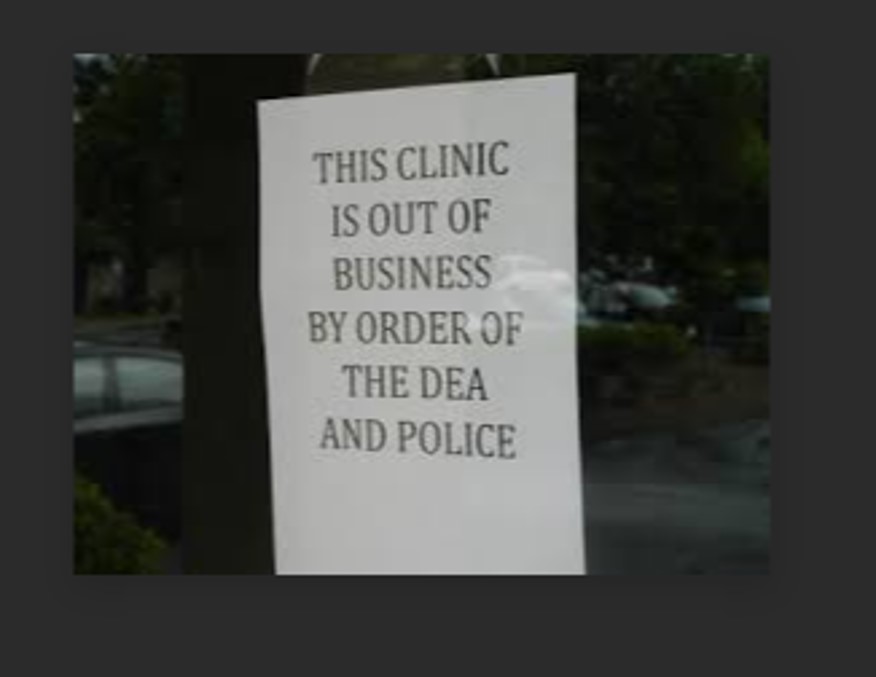
Nationwide Investigations
How Pain Clinic Owners Turned Patients’ Pain into Enormous Profits
How to Recognize a Pain Pill Mill in Your Community
Authorities Crack Down on Pharmacists Fulfilling and Dispensing Massive Amounts of Pain Pills
How Federal Agencies Are Dismantling New York Pain Clinics Vast Pain Pill Operations
How Federal Agencies are Shutting Down Maryland Pain Clinics Operating as Pill Mills
How Authorities Have Shuttered Georgia Pain Clinics Massive Pain Pill Distribution
How Authorities Are Cracking Down on Virginia Pain Clinics Massive Pain Killer Pill Operations
How Authorities Are Shutting Down Texas Pain Clinics Enormous Pill Prescriptions
How Authorities Are Cracking Down on Rogue Pain Clinics in Florida
How State and Federal Authorities are Dismantling Pill Mills in the United States
State and Federal Agencies Are Shuttering California Pain Clinics Huge Distribution of Opioid Pain Pills
ADD COMMENTS BELOW
- Essential Christmas Songs for the Holiday Season
- Stylish Outdoor Fire Pits and Patio Heaters
- How to Create an Ergonomic Workspace at Home or Work
- Benefits of Humor and Laughter in Life
- Balancing Success: Practical Self-Care Strategies for Entrepreneurs
- Guides to Backpacking, Mountain Biking and Hiking Georgia
- Ways to Pay It Forward and Change Lives
- Email Marketing Campaigns for Small Business Owners
- Guide to Martha Stewart’s Hugely Successful Concept and Art of Presentation
- Guides to Backpacking and Hiking Canada
- Timeline of Events Leading to Rudy Giuliani’s Legal Troubles
- Backpacking, Hiking, and Camping Safety Guides
- Moving and Relocating to Atlanta: How to Find Your New Home
- Money Matters: Insider Tips to Buying a Home
- Renting vs Owning a Home
- Ways to Build Positive Credit
- Do It Yourself Credit Improvement Process
- A Trail of Clues to the Murder of Nicole Brown Simpson
- How Centra Tech’s Bitcoin Cryptocurrency Scheme Was Hatched and Discovered
- Starting a New Business as a New Mother: Tips for Thriving
- Guides to Backpacking and Hiking the Carolinas
- Guides to Hiking New York State and New Jersey
- Guides to Hiking California and Nevada
- The Tragic Murder of Rebecca Postle Bliefnick
- How a Grad Student Murder Spotlights Female Joggers’ Safety Concerns
- How Massive Commercial Financial Fraud Was Discovered in Singapore
- Did Billy Ray Turner Conspire with Sherra Wright to Kill Former NBA Player Lorenzen Wright?
- How Operation Rebound’s 7-Year Cold Case was Finally Solved
- Mastering DIY Marketing: Essential Skills and Strategies for Small Business Owners
- How a GeoLocation Expert Tracked a Killer
- Transgender Law Enforcement Officer Denied Medical Coverage for Gender Dysphoria
- How Video Surveillance Cameras Helped Identify and Track a Killer
- How Investigators Solved the Murder Mystery of Army Sergeant Tyrone Hassel III
- How a Love Obsession Led to the Brutal Murder of Anna Lisa Raymundo
- How Stephen Grant Tried to Get Away with Killing His Wife
- How Unrelenting Catfish Schemes Led to Fatal Suicide
- How Pain Clinic Owners Turned Patients’ Pain into Enormous Profits
- How to Recognize a Pain Pill Mill in Your Community
- How Authorities Have Shuttered Georgia Pain Clinics Massive Pain Pill Distributions
- How Pain Doctors Massive Opioid Prescriptions Lead to Pain Pill Overdose Deaths
- How Authorities Are Dismantling Pennsylvania Pain Clinics Prescribing Excessive Amounts of Opioid Pain Pills
- How Authorities Are Dismantling Alabama Pain Clinics Pain Pill Schemes
- How the Gilgo Beach Homicide Investigation Has Progressed
- How NYC Architect was Linked to Three Women’s Remains Found on Gilgo Beach
- How Investigators Discovered a Serial Killer Hiding in Plain Sight
- How Police Discovered the Concealed Murders of the Chen Family
- How a Vicious Child Custody Battle Led to the Murder of Christine Belford
- How Authorities Finally Captured a Serial Killer in Southern Louisiana
- How Authorities Are Busting Pill Mills in The Carolinas
- How Montgomery County Police Quickly Unraveled the Murder of a Retail Store Employee in Bethesda
- How a Child Rapist and Murderer Almost Got Away with His Crimes in England
- How Authorities Are Dismantling Pill Mills in the United States
- How Federal Agencies Are Dismantling Michigan Pain Clinic Doctors Scheme to Distribute Enormous Amounts of Opioid Pain Pills
- How Authorities Are Cracking Down on Virginia Pain Clinics Massive Pain Pill Operations
- How Authorities Are Honing in on Kentucky Pain Clinics Distributing Opioid Painkiller Pills for Profit
- How Federal Agencies Are Shutting Down Maryland Pain Clinics Operating as Pill Mills
- How Federal Agencies Are Dismantling New York Pain Clinics Vast Pain Pill Operations
- How the Senseless Murder of Tequila Suter Was Quickly Solved
- How Authorities Are Dismantling Ohio Pain Clinics Prescribing Excessive Pain Pills
- How Authorities are Dismantling Tennessee Pain Clinics Prescribing Massive Quantities of Opioid Pain Pills
- How State and Federal Agencies Are Shuttering California Pain Clinics Huge Distribution of Opioid Pain Pills
- How Authorities Are Shutting Down Texas Pain Clinics Enormous Pill Prescriptions
- How Authorities Are Cracking Down on Rogue Pain Clinics in Florida
- George Brothers Used Pain Clinics to Disburse Oxycodone Pain Killer Pills
- How Authorities Have Convicted Pharmacists Fulfilling and Dispensing Massive Amounts of Pain Pills
- Georgia Election Workers Defamation Lawsuit and Trial
- Rudy Giuliani’s Election Fraud Allegations and Ensuing Lawsuits
- British Singer George Michael’s Last Christmas
- Shaping Tomorrow’s Leaders
- Kathleen Peterson’s Mysterious Staircase Death: Accident or Homicide?
- How Police Officer Stephanie Lazarus Almost Got Away with Murder
- Mysterious Staircase Death Investigations
- Elizabeth Ratliff’s Mysterious Staircase Death in Germany
- The Death of Vincent Foster Remains a Mystery 30 Years Later
- Biloxi Murder Conspiracy: A High-Stakes Crime